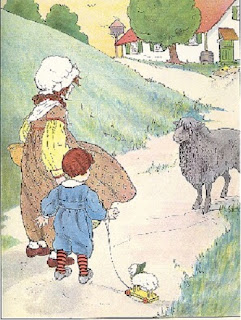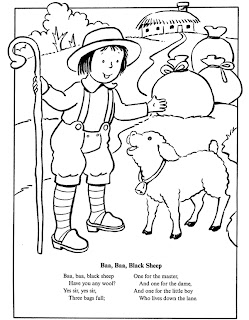Hallo!
(Afrikaans way to say 'hello')
I see I have people from South Africa checking out my blog.
Welcome!
Today I will be exploring the world of
nursery rhymes
children's poetry
folk tales
and
fairy tales.
Yep. That's a lot!
vintage Mother Goose pop up book
Mother Goose is the most common source named
for books with nursery rhymes.
She has been portrayed in many different guises,
but most have been benevolent.
fabric print by Kim Stembo
Grenwich Press
Let's get started with
Nursery Rhymes first -
Many nursery rhymes have their roots in political satire,
and behavior, manners and simple math repetitions.
Like this one:
The Cat and the Fiddle
Hey, diddle, diddle!
The cat and the fiddle,
The cow jumped over the moon;
The little dog laughed
To see such sport,
And the dish ran away with the spoon.
This was actually a satire on the political situation in England at the time!
Each character had a corresponding figure in English court politics:
the cat
the fiddle
the cow
the moon
etc.

This scherensnitte pattern
is from an out of print book by BackStreet Originals
called The Spotted Farm.
Here's a nursery rhyme that employs repetition
to help learn some mathematics!
Going to St. Ives
As I was going to St. Ives
I met a man with seven wives.
Every wife had seven sacks,
Every sack had seven cats
Every cat had seven kits.
Kits, cats, sacks, and wives,
How many were going to St. Ives?
Here is a cat to make using the iris folding technique:
Here is another example of using rhyme
to learn mathematics:
to learn mathematics:
Baa, Baa, Black Sheep
Baa, baa, black sheep
Have you any wool?
Yes sir, yes sir,
Three bags full;
One for the master,
And one for the dame,
And one for the little boy
Who lives down the lane.
1889 vintage illustration
coloring book versions, Dover books
This next familiar nursery rhyme is actually a sad commentary about the Plague in Europe that started in the 1300's
and decimated entire cities during the medieval time.
Ring around theRosy
Ring around the rosy,
A pocketful of posies
"Ashes, Ashes,"
We all fall down!
The symptoms of the Plague (bubonic plague) included a rosy red rash in the shape of a 'ring' on the skin. Pockets, sachets and pouches were filled with sweet smelling herbs (posies) which were carried. At the time the disease was thought to be transmitted by 'bad smell'. "Ashes, Ashes" refers to the cremation of the bodies. Who can forget the Monty Python scene where the cart is going around the city, with the man calling out
"Bring out your dead! Bring out your dead!"
That skit is based on the Great Plague in Europe. Over 60% of the population of Europe was dead (we all fall down), and it only stopped because of a Great Fire in London, 1666, which killed the rats - the source of transmitting the disease.
The reality is not so charming,
yet it has become a familiar and loved nursery rhyme.
illustration by Kate Greenaway
vintage 1918 illustration
That's going to be it for today.
I had lunch with my husband, so not as much time as usual!!
:0)
I will be continuing to offer nursery rhymes,
and then get into Fairy Tales and Folk Tales...
have a super day of SUMMER!
inkspired















No comments:
Post a Comment